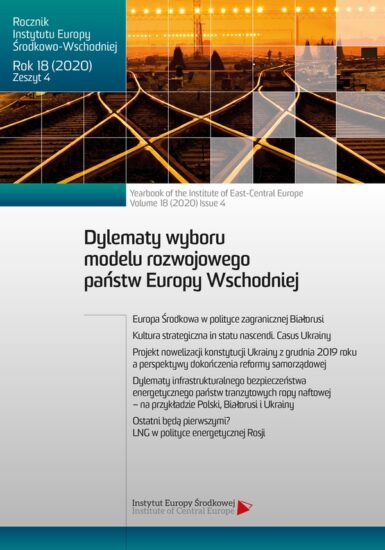The Europeanization of organized interest groups in selected countries of Central and Eastern Europe
ORCID: Rafał Riedel: 0000-0001-8344-2944
Afiliacja: Uniwersytet Opolski, Polska
Strony: 147-169
Wydanie: Lublin 2020
DOI: https://doi.org/10.36874/RIESW.2020.4.7
Sposób cytowania: R. Riedel, S. Czarnecki, Europeizacja zorganizowanych grup interesu w wybranych państwach Europy Środkowej i Wschodniej, „Rocznik Instytutu Europy
Środkowo-Wschodniej” 18(2020), z. 4, s. 147–169, DOI: https://doi.org/10.36874/RIESW.2020.4.7.
Słowa kluczowe: Europa Środkowa i Wschodnia, europeizacja, lobbing, rzecznictwo, zorganizowane grupy interesów
Abstrakt: In democratic countries, advocacy organizations and other organized interest groups play an important role in the process of creating public policies and as a consequence, they influence the final shape of the implemented development models. The inclusive decision-making process enables interest groups to fulfill a variety of functions. Interest groups are very important legitimation channel, they provide expert knowledge, and also they are major channel through which citizens can express their opinions to the decision-makers. Through their activities, advocacy organizations may influence specific policies as well as the overall direction of the evolution of the development model. This paper describes and explains the Europeanization process and its pressure on interest groups in Central and Easter Europe, also answering the question to what extent the Europeanization process enables interest groups to access the political process at the state level. Article relies on data from a large-scale survey of organised interests operating in four CEE countries (Poland, Hungary, Slovenia and Czech Republic) in three policy sectors i.e. health care, higher education and energy policy. Based on the collected data, a linear regression analysis was performed.
Bibliografia:
Anioł W., Europeizacja polskiej polityki społecznej, „Studia Europejskie” 2003, nr 3.
Bouwen P., Exchanging access goods for access: A comparative study of business lobbying in the European Union institutions, „European Journal of Political Research” 2004, no. 3(43), https://doi.org/10.1111/j.1475-6765.2004.00157.x.
Caporaso J., Three Worlds of Regional Integration Theory, [w:] Europeanization. New Research Agendas, red. P. Graziono, M.P. Vink, New York 2007.
Christiansen J.G., EU Legislation and National Regulation: Uncertain Steps Towards a European Public Policy, „Public Administration” 2010, vol. 88, no. 1, https://doi.org/10.1111/j.1467-9299.2010.01813.x.
Dür A., De Bièvre D., The Question of Interest Group Influence, „Journal of Public Policy” 2007, no. 27(01).
Easing R., Multilevel Governance and Business Interests in the European Union, „Governance” 2004, no. 17(2).
Europeanization. New Research Agendas, red. P. Graziono, M.P. Vink, New York 2007.
Grabbe H., How does Europeanization affect CEE governance? Conditionality, diffusion and diversity, „Journal of European Public Policy” 2001, no. 8(6), https://doi.org/10.1080/13501760110098323.
Ladrech R., Europeanization of Domestic Politics: The Case of France, „Journal of Common Market Studies” 1994, no. 32(1).
McGrath C., Towards a lobbying profession: developing the industry’s reputation, education and representation, „Journal of Public Affairs” 2005, no. 5(2), https://doi.org/10.1002/pa.14.
Niebylski M., Choroś B., Proces projektowania i realizacji polityk publicznych – ujęcie teoretyczne, [w:] Polityki publiczne w teorii i praktyce, red. B. Choroś, M. Niebylski, Toruń 2014, https://doi.org/10.31338/uw.9788323532279.pp.159-184.
Olsen J., The Many Faces of Europeanization, „Journal of Common Market Studies” 2002, 40(5).
Olson M., The logic of collective action: Public goods and the theory of groups, Cambridge 1965.
Riedel R., Europeizacja – koncepcje i agenda badawcza, [w:] Europeizacja – mechanizmy, wymiary, efekty, red. R. Riedel, A. Pacześniak, Oslo–Toruń–Wrocław 2010.
Riedel R., Europeizacja – konceptualizacja kategorii badawczej, [w:] Europeizacja polityk publicznych w Polsce, red. R. Riedel, Opole 2016.
Riedel R., Europeizacja jako nurt badawczy studiów europejskich, „Studia Europejskie” 2008, nr 2(46).
Riedel R., Europeizacja polityk publicznych, „Wrocławskie Studia Politologiczne” 2015, nr 18.
Riedel R., Kontestacja państwa dobrobytu a integracja europejska – perspektywa neofunkcjo-nalistyczna, „Politeja” 2009, nr 1(11).
Riedel R., Podejścia i teorie w badaniach nad europeizacją, [w:] Europeizacja – mechanizmy, wymiary, efekty, red. R. Riedel, A. Pacześniak, Oslo–Toruń–Wrocław 2010.
Risse T., A European Identity? Europeanization and Evolution of a Nation State Identities, New York 2001.
Rosamond B., Theories of European Integration. The European Union Series, London 2000.
Schmitter P., The Neofunctional Hypothesis about International Integrational Integration, „In-ternational Organization” 1969, vol. 23, no. 1.
Surdej A., The scenarios for the future of EU public policies: the perspective of the theory of public goods, „Poznań University of Economics Review” 2014, vol. 14, no. 4.
Wołek A., Europeizacja w słabym państwie: przypadek polskiego przemysłu stoczniowego, [w:] Polska w grze międzynarodowej. Geopolityka i sprawy wewnętrzne, red. J. Kloczkowski, Kraków 2010.
Słowa kluczowe: Europa Środkowa i Wschodnia, europeizacja, lobbing, rzecznictwo, zorganizowane grupy interesów
PDF: Pobierz